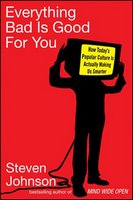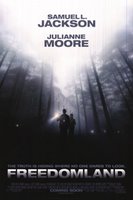 When I first spied Steven Johnson's "Everything Bad is Good for You: How Today's Popular Culture Is Actually Making Us Smarter" at the Strand, I'm pretty sure I shook my head as I read the dustjacket's description. I asked myself, "Can this be true?"
When I first spied Steven Johnson's "Everything Bad is Good for You: How Today's Popular Culture Is Actually Making Us Smarter" at the Strand, I'm pretty sure I shook my head as I read the dustjacket's description. I asked myself, "Can this be true?"
Here's Publishers Weekly's take on it: "Worried about how much time your children spend playing video games? Don't be, advises Johnson—not only are they learning valuable problem-solving skills, they'd probably do better on an IQ test than you or your parents could at their age. Go ahead and let them watch more television, too, since even reality shows can function as "elaborately staged group psychology experiments" to stimulate rather than pacify the brain...Johnson lays out a strong case that what we do for fun is just as educational in its way as what we study in the classroom (although it's still worthwhile to encourage good reading habits, too)."
After starts and stops for several months, I finally finished it in late January. It wasn't the length of it -- it checks in at a quite manageable 199 pages -- but the central ideas Johnson presents here (that we're getting smarter, not dumber, in this media age) on pop culture do not ring true to me; mainly because of this disconnect, I kept setting it aside for other books that flew in over the transom.
Johnson makes some very valid points about the rise of IQ over time and how videogames teach children to problem-solve, but too often it comes across like he's painting too broad a stoke. Anyone can cherry-pick the supporting data that "Arrested Development" and "The Sopranos" are smarter than the shows of yesteryear because ofadditionall plotlines and characters, as well as that the complexity of the latest "Final Fantasy" is miles ahead of "Pac-Man." But the direct correlation that he makes, and attempts to prove, to us being smarter overall because of this is suspect. He doesn't back it up all that well. Circular reasoning, anyone?
The case, I'm sorry to say, is not that strong at all. All in all, the book's an entertaining read, but it comes across more as a graduate thesis topic being presented than something proved; it's an area that needs additional study and further research. Me, I'm looking forward to Mike Judge's next film, "Idiocracy" (out in October, as of this writing) which takes the opposite view-- I think that's a little more dead-on.



 Ever been really, really disappointed by the film adaptation of a book you really, really liked? That's how I feel this weekend with Richard Price's "Freedomland". Skip it.
Ever been really, really disappointed by the film adaptation of a book you really, really liked? That's how I feel this weekend with Richard Price's "Freedomland". Skip it.


